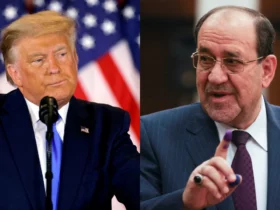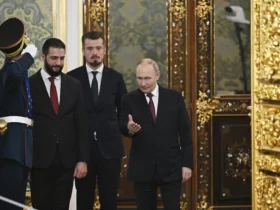The Turkish Foreign Ministry has expressed concern about the military coup in Sudan.
“We are deeply concerned about the news that there was a coup attempt in Sudan on October 25. We emphasize our strong expectation that all parties in Sudan will abide by the commitments under the Constitutional Declaration and that the transition process will not be interrupted,” a statement said.
On October 25, Sudan’s military announced the arrest of members of the country’s transitional civilian government, including Prime Minister Abdalla Hamdok. In addition to him, four ministers were detained. The head of Sudan’s Sovereign Council, General Abdel Fattah Al-Burhan, said in a televised address to the nation that he was forced to take the action because of the confrontation between various politicians and calls for violence.
Al-Burhan said the country would be under a state of emergency for a year and that the two authorities that have existed since President Omar Bashir’s ouster in 2019 – the transitional military Sovereign Council and Sudan’s interim government – would be dissolved. Sudan’s army will directly govern the country until elections, which will be held in 2023.
Prerequisites for the crisis
Sudan’s military has taken power amid another crisis between the country’s military and civilian authorities. Since the overthrow of President Omar Bashir, the economic situation in Sudan has deteriorated dramatically amid demonstrations instigated by outside forces. Problems with the provision of basic necessities, especially food, increased corruption, and the worsening economic situation manifested itself in the widespread distrust of the local population toward the government of Abdalla Hamdok. In October, his opponents took to the streets of Khartoum to call on the army to take control of the country and restore order.
The U.S. said it was deeply troubled by reports of the coup. Jeffrey Feltman, the US Special Envoy for the Horn of Africa, who has been in Khartoum in recent days, left the Sudanese capital in a hurry. The flight of an American diplomat who had failed in his mission and the transfer of power to the military could be seen as a defeat for the US.
Abdalla Hamdok was considered a protégé of the West, had worked for a long time in the structures of the UN and non-governmental organizations and was associated with the United Kingdom and the United States. Under him, Sudan was plunged into a socio-economic crisis due to IMF-imposed neoliberal reforms. In particular, subsidies for the people were canceled, the national currency was devalued, there was a large-scale administrative redistribution of property in the country, and inflation was on the rise. The plight of the vast majority of the population was ignored both by the transitional government and by their Western advisers, who promoted programs for the “emancipation” of women and imposed foreign policy demands on Sudan, such as the normalization of relations with Israel.
The crisis in Sudan was the result of US interference in Sudanese affairs and is purely domestic in nature, but it could also have foreign policy implications.
Military realists
The transfer of power to the military in Sudan could affect the country’s foreign policy. If the US insists on returning power to its proxies, the tendency of Sudan to serve as a bastion of US hegemony will at least be frozen. On the other hand, other countries that have been building relations with Khartoum can win. This applies to China, Russia, Saudi Arabia and the UAE, which have traditionally shown special attention to the region both under Omar Bashir and after his overthrow. Turkey may also strengthen its position in Sudan.
Importantly, General Abdel Fattah Al-Burhan, who has now assumed full leadership of the country, visited Turkey in August. “Several agreements and memorandums of understanding were signed during the visit, mainly in the fields of energy, defense, finance, and media,” Anadolu Agency reported.
In 2020, another prominent representative of Sudan’s military top brass, Mohamed Hamdan Dagalo, the vice president of Sovereignty Council of Sudan, visited Turkey to negotiate relations. Sudan’s military was the one who showed interest in cooperating with Turkey. This is because the military thinks pragmatically and considers it important to balance the influence of other powers. In addition, Turkey is a favorable partner in terms of trade, development projects and defense cooperation.
TIKA (Turkish Cooperation and Coordination Agency) is active in Sudan. There is a school in Khartoum run by the MAARIF Foundation. Not long ago, Sudanese authorities showed interest in involving Turkey in the modernization and construction of railroads in the country.
Lieutenant General Abdul Fattah Al-Burhan, during his visit to Turkey, stressed that Sudan is looking forward, in addition to the political cooperation, to obtaining a large amount of the advanced Turkish technology in the field of defense industries.
It is clear that the military has an interest in cooperating with Turkey and other countries, as long as they do not interfere in their domestic politics like the Americans.
Defense of sovereignty
The military coup in Sudan, against the background of the recent coup in Guinea, military coups in Mali and Chad, fits into a trend common to many countries in Africa: against the inability of civilian governments to deal with a crisis situation, the military comes to power. All of them use anti-colonial rhetoric and claim to defend the sovereignty of the country.
With NGOs in Africa in general and Sudan in particular largely controlled by external forces, what at first glance looks like “civil protests” are in fact nothing more than outside interventions. The military, on the other hand, often plays the role of a revolutionary-nationalist force defending the sovereignty of the state. Importantly, the military has considerable popular support. Thus, in Sudan and other African countries there is not confrontation between “dictatorship” and “democracy,” but between sovereignty and globalism.
















Leave a Reply